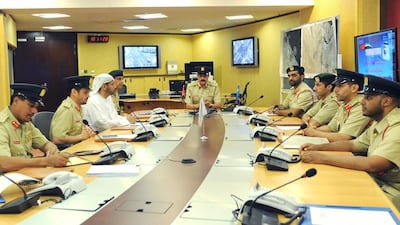DUBAI // Dubai's 999 emergency call centre received more than 1.4 million calls in the first six months of the year, the police agency reported on Sunday.
The Control and Command Centre at Dubai Police’s general department of operations answered 1,405,286 calls. Of those, 97 per cent – or 1,362,184 calls – were answered within 10 seconds by the centre’s operators. Last year, 2.4 million calls were placed to the emergency line.
Col Omar Abdullah Al Shamsi, director of the department, praised the operators for their hard work.
“If you compare, in Dubai city, one of the smaller cities in the world ... with London city, London is almost 2.4 million calls in one year,” he said. “Of course it’s a good performance to answer this many calls. Do you know how many call takers we have to answer these 1.4 million? There are 20 call takers around the clock. There is an average of 20 call takers.”
The operators also succeeded in meeting the target set by the department to have 97 per cent of all calls answered within 10 seconds, said Col Al Shamsi.
“There is no 100 per cent anywhere in the world,” he said. “We answer all the calls, but the 3 per cent is maybe 15 seconds or 20 seconds, but we answer them.”
During peak times, the number of operators on the job is increased up to 30 per eight-hour shift.
“During Ramadan, the peak is different. From 10 in the morning until 6pm, this is a peak time of calling 999, but on normal days, the peak time is from after 1pm until 10 or 11pm,” said Col Al Shamsi.
He said many of the calls received by the 999 dispatchers were non-emergency, which costs the department more money.
“That’s why we are increasing the number of human resources, which increases our cost, just to handle non-emergency calls.”
An exact figure of how many non-emergency calls were placed to the 999 line were not immediately available, but Col Al Shamsi said that the volume of calls for the first six months of the year compared with the same period last year increased about 18 per cent for all types of calls.
“We need to pass this to the public – please do not call 999 unless you know that you are in an emergency situation,” he said. “Anything that you feel is an emergency, please call us. But for inquiries, don’t call.”
Col Al Shamsi, whose department also oversees dispatchers who answer non-emergency calls received at the toll-free number 901 call centre, said public-awareness campaigns had been successful in educating people not to tie up the main emergency line with inquiries about public or private services.
“We are seeing that it is increasing day by day. People start to know it,” he said. “Both of them are under my responsibility, so I give instruction whenever people call 999 for inquiry. We don’t give them any answer for their inquiry. We say this is an emergency [number], sorry, thank you, bye-bye. If you need answer for your questions, please call 901.”
The 901 call centre received 44,556 calls during the first six months of this year compared with 30,951 calls during the same period last year.
The average time for security patrols to reach emergency scenes was 9 minutes, 37 seconds during the first half of this year, according to Dubai Police. For non-emergency situations, police were able to arrive on the scene in an average of about 12 minutes.
The six-month statistics were announced at an evaluation meeting for the general department of operations chaired by Maj Gen Khamis Mattar Al Mazeina, chief of Dubai Police, and attended byseveral senior police officials.
rpennington@thenational.ae

